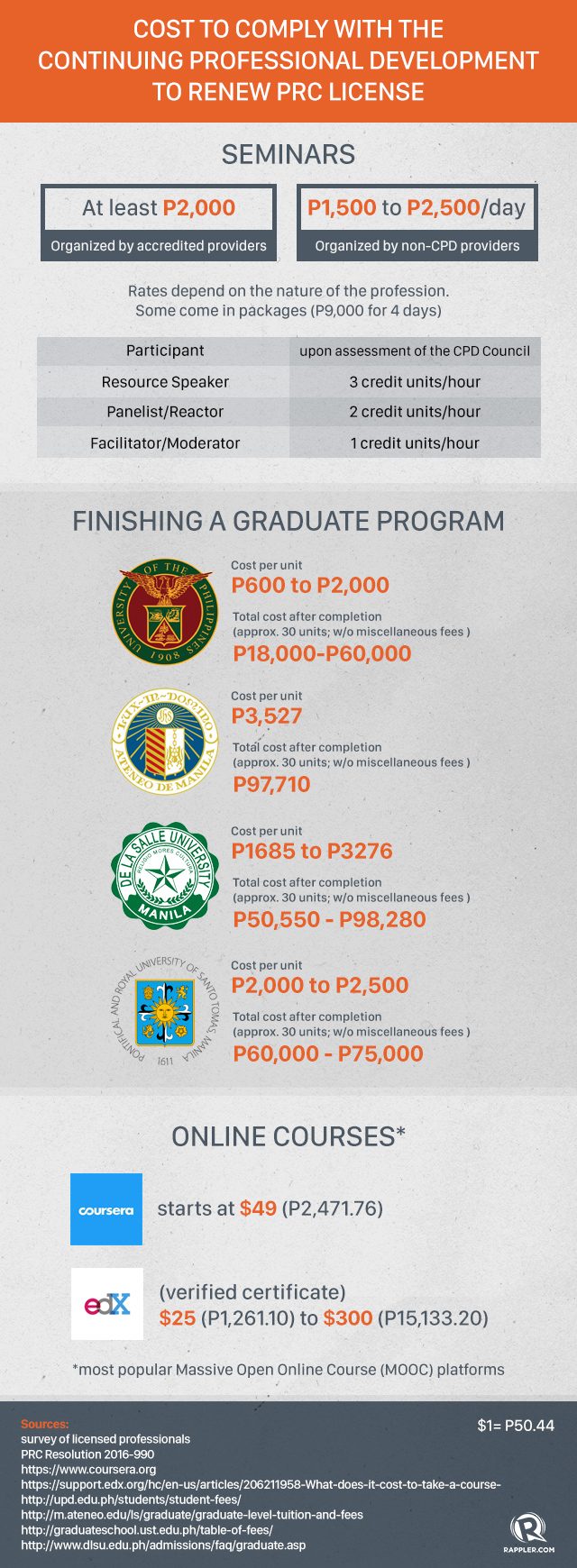SUMMARY
This is AI generated summarization, which may have errors. For context, always refer to the full article.

MANILA, Philippines – Professionals renewing their licenses with the Professional Regulatory Commission (PRC) will potentially have to shell out, as the agency begins implementing the law requiring workers to constantly seek opportunities to boost their skills.
Republic Act 10912 or the Continuing Professional Development Act of 2016 requires professionals to earn a specific number of units before their licenses are renewed.
The units will be acquired through development programs, like seminars, graduate studies, and online courses, among others.
They come with costs, of course. More than 50,000 professionals have signed an online petition calling for a review of the law.
Professional track
Workers covered by the PRC should sign up for training programs organized by accredited groups or professional associations of the PRC. Registration fee for these seminars cost at least P2,000 per day.
Depending on the nature of a profession, some registration fees reach up to P12,000 for 3 days or P4,000 per day.
Based on PRC Resolution Number 2016-990, which sets the guidelines for the program, the CPD council is tasked to regulate the amount the providers require.
PRC Standards and Inspection Division officer-in-charge Liza Hernandez said that they have yet to set an amount range for the registration fee, but they are ensuring that it does not reach a burdensome amount.
“Part of our requirement is the seminar fee. If the fee is exhorbitant, we will disapprove of the program…. They (providers) have to apply for their program at least 45 days prior to offering it,” explained Hernandez in a message to Rappler.
Since there are a few accredited providers, professionals may also choose to join trainings hosted by other outfits.
These come around the same price as those organized by PRC-accredited institutions. But workers would have to shoulder a P1,000 processing fee to convert their attendance to credit points.

Academic track
They may also choose to pursue a graduate degree. The units to be credited will be equal to the total number of units required to finish the program. However, this will only be counted for one renewal period (3 years).
Other options include pursuing a fellowship grant, a post-graduate diploma or certificate, or being a professor in an academic institution.
Online courses such as those available in websites like Coursera and Edx can also be credited provided a certificate will be presented to the PRC. Certificate courses under these massive open online course platforms come at a minimum of $25 $25 (P1,261.10) to as much as $300 (P15,133.20).
Other options for those needing credits include:
- Being the author of a published paper, article, or book
- Peer-reviewing a published work
- Editing a published book
- Participating in study tours
- Engaging in socio-civic activities like medical missions and outreach programs
- Gaining an award or recognition
To prevent professionals from having to spend, the PRC is urging companies to apply for accreditation so that their internal trainings and seminars may be credited. Accreditation costs P5,000 based on the revised CPD guidelines.
The PRC also encourages government agencies to apply for accreditation so that professionals in the public sector would be able to comply for free through the agency’s own professional development programs. – Rappler.com
Add a comment
How does this make you feel?





There are no comments yet. Add your comment to start the conversation.